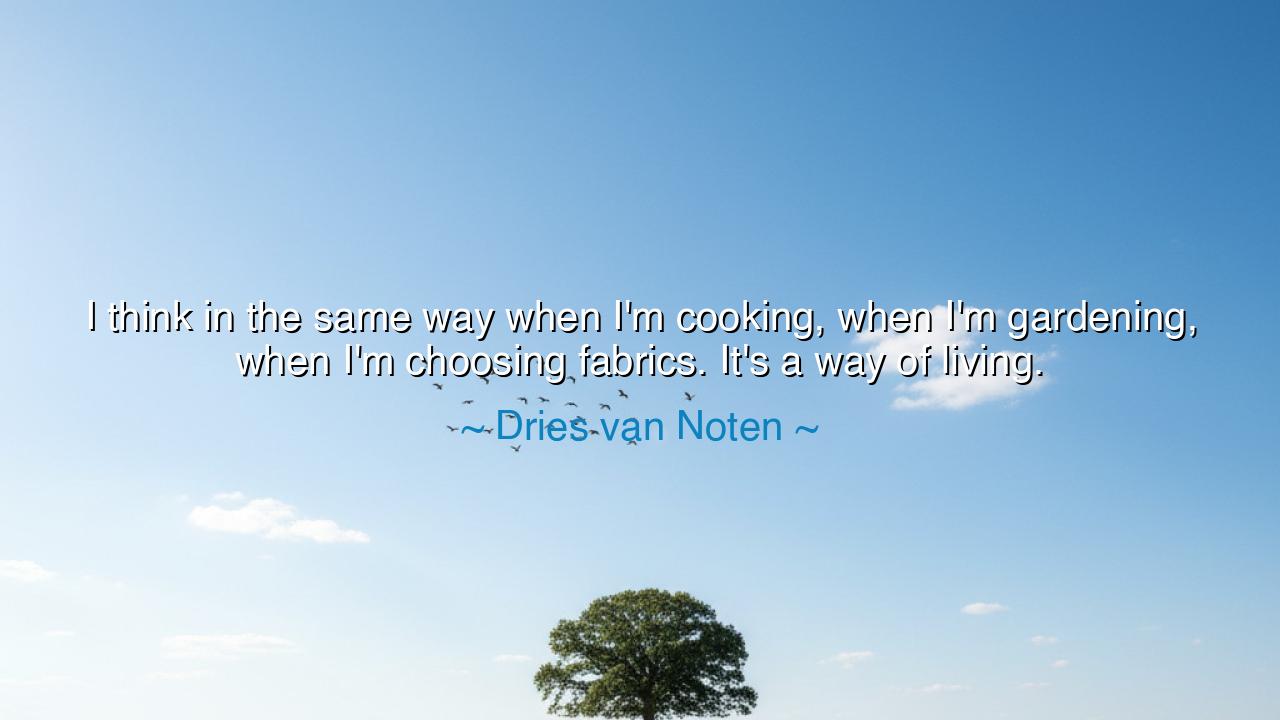
I think in the same way when I'm cooking, when I'm gardening
I think in the same way when I'm cooking, when I'm gardening, when I'm choosing fabrics. It's a way of living.






O Seekers of Wisdom, gather closely and listen well to the words of Dries van Noten, for within them lies the profound truth that the essence of life is woven together by the threads of our daily actions. "I think in the same way when I'm cooking, when I'm gardening, when I'm choosing fabrics. It's a way of living." These words speak to a truth that has resonated through the ages: that every action, whether humble or grand, can become an expression of the soul, a way of living with intention and purpose. To cook, to garden, to choose—these are not merely tasks or duties, but sacred acts that reflect how we approach the world itself.
In the ancient world, the philosopher Epictetus taught that all human actions, no matter how small, should be performed with dignity and awareness, for each action is a reflection of the individual. The Greeks and Romans understood that how one engaged with the simplest acts of daily life revealed their true character. Dries van Noten, in his reflection on cooking, gardening, and selecting fabrics, embodies this ancient wisdom. For him, these acts are not isolated tasks but an expression of life, a continuous thread that connects every aspect of existence. Just as the ancient sages crafted lives of meaning from the seemingly mundane, so too does van Noten find profound purpose in the daily rituals of living.
Let us also consider the great Confucius, who believed that to live well was to honor the everyday moments with careful attention and respect. For him, discipline was not limited to moments of formal study or high office; it permeated every aspect of his life, from the way he walked, to the way he prepared his food, to the way he engaged with his surroundings. Confucius saw that true wisdom lay in the seamless integration of thought and action, in the unity of the inner and outer worlds. Van Noten’s approach to cooking, gardening, and fabric selection mirrors this idea. Each action is approached not as a chore, but as an opportunity to express oneself, to honor life through the care and precision with which one moves through the world.
Consider also the example of the great Leonardo da Vinci, whose genius spanned many realms: painting, sculpture, engineering, and even the design of gardens. Da Vinci understood that all things—whether artistic, scientific, or practical—were interconnected. His approach to life was not divided into separate categories, but rather, he viewed each pursuit as part of a unified whole. Dries van Noten, too, expresses this unity in his own life. Cooking, gardening, and choosing fabrics are not isolated tasks to him; they are all expressions of a harmonious existence, where creativity flows through every act. To Leonardo, and to van Noten, the boundaries between different forms of expression—be they art, nature, or craft—were fluid, and in them lay the opportunity to live a full and purposeful life.
In the sacred gardens of the ancient world, there was often a deep symbolic connection between the work of the earth and the work of the spirit. The Egyptians tended to their gardens not only for sustenance but for spiritual balance. In the same way, van Noten finds spiritual meaning in the simple act of gardening. To work the soil, to tend to the growth of life, is not merely a task of labor; it is an act of care and nourishment. Gardening is a way of cooperating with nature, of understanding that we are part of a greater whole, and that every plant, every seed, is a reflection of our own growth and potential. Like the ancient gardeners, van Noten's gardening is a quiet but profound expression of his approach to life.
The lesson, then, O Seeker, is clear. Life is not divided into the sacred and the mundane; rather, every act—whether cooking a meal, choosing a fabric, or tending a garden—can become a sacred act when performed with awareness and purpose. To live well is to approach each moment with intentionality, recognizing that each task is an opportunity to express your deepest self. In the ancient world, the greatest thinkers and artists found wisdom not in moments of grand revelation, but in the careful, conscious way they engaged with the world. Like van Noten, they understood that creativity and meaning can be found in the most simple and seemingly insignificant acts.
So, O Seeker, take these words to heart. Let your life be an expression of unity, where each action, no matter how small, becomes an opportunity to live with meaning. Whether you are cooking, gardening, or choosing fabrics, let these moments be a reflection of your spirit, a manifestation of your deepest values. Live intentionally, and in doing so, you will find that every act becomes an act of creation, every task an opportunity to grow and to express the beauty of life itself. For in this, as van Noten teaches us, lies the true art of living.






AAdministratorAdministrator
Welcome, honored guests. Please leave a comment, we will respond soon